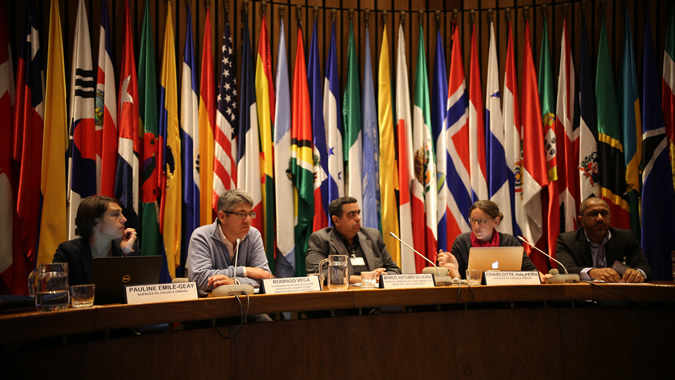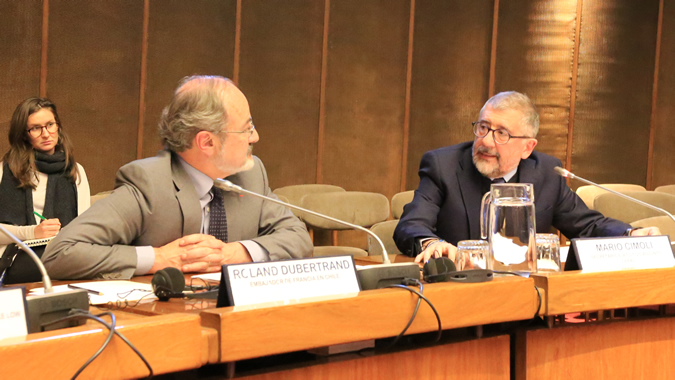Multi-stakeholder Collaboration is Critical to Achieving Sustainable Urban Mobility
Work area(s)
In the framework of the Second Cities Conference, ECLAC and Sciences Po, with support from the government of France, held a training seminar to build capacities for coordination on mobility policies.

Meeting the challenge of sustainable urban mobility entails the collaboration of multiple actors from diverse sectors, both public and private, according to the experts who participated in a training seminar held today at the headquarters of the Economic Commission for Latin America and the Caribbean (ECLAC) in Santiago, Chile.
The seminar on Coordination among multiple stakeholders for sustainable urban mobility in Latin America and the Caribbean – organized by ECLAC and the Sciences Po Urban School, with support from the government of France, and held in the framework of the Second Cities Conference – sought to build capacities for coordination on mobility policies and promoted the forging of critical approaches and strategy analysis.
It also presented concrete cases developed in different metropolitan contexts as references for achieving better coordination among multiple actors.
Participants in the training seminar included Charlotte Halpern, a scholar at Sciences Po; Marco Antonio Silveira, Manager of the Office of Mobility Planning in Belo Horizonte, Brazil; Rodrigo Vega, Research Coordinator at the School of Architecture of Universidad Diego Portales in Chile; and Tomás Echiburú, from the Chilean organization Ecosistemas Humanos (Human Ecosystems).
During her remarks, Charlotte Halpern highlighted the importance of coordinating objectives that cannot be reached through individual actions and devising goals for cities in a more collective way.
She sustained that coordination is key to achieving greater coherence and reducing gaps and contradictions.
Other participants in the seminar included government representatives and technical experts at a national and local level, representatives of private companies active in the mobility sector, members of civil society and researchers.
Later in the day, authorities gathered at a session that addressed the central role of local governments in the implementation of the New Urban Agenda and the 2030 Agenda for Sustainable Development.
The speakers there were Gervoy Paredes, Mayor of the Chilean city of Puerto Montt and member of Mercociudades; Graciela Dede, Human Rights Adviser from UN Uruguay; Manuel Redondo, President of Fira Barcelona México; Marcelo Cabrera, Mayor of Cuenca, Ecuador; and Nelson Fernández, of the Association of the Major Metropolises for Latin America and the Caribbean.
In their remarks, these experts underscored that, in order to produce significant changes in people’s quality of life and lasting changes in our systems and territories, it is fundamental to highlight the centrality of local governments, since they are on the front line of intervention in the dynamics of urban life.
In that vein, they identified relevant experiences and actions so that local governments can integrate in their daily work the criteria contained in Sustainable Development Goal (SDG) 11, on sustainable cities and communities, and the New Urban Agenda.
The participants also identified mechanisms, synergies and challenges for facilitating appropriate monitoring and reporting on the progress made in the area of sustainable urban development, both from a quantitative and qualitative perspective.
Related content

The City is an Opportunity for Structural Change with Equality and an Economic Policy Instrument for Countries
The Second Cities Conference concluded with a call to strengthen public-private dialogue for urban sustainability in Latin America and the Caribbean.

Achieving Sustainable Mobility Systems Essential for Combating Climate Change and Attaining Inclusive Urban Development
Second Cities Conference: Towards Safe, Affordable and Sustainable Mobility in Latin America and the Caribbean, inaugurated today at ECLAC headquarters in Santiago, Chile.
Related event
Second Cities Conference: Towards Safe, Affordable and Sustainable Urban Mobility in Latin America and the Caribbean
The Cities Conference II will be held at ECLAC’s headquarters in Santiago, Chile during the 16-19 of October 2018.
Type
Country(ies)
- Latin America and the Caribbean